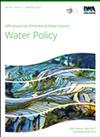Depression: Does water matters?
IF 1.8
4区 环境科学与生态学
Q4 WATER RESOURCES
引用次数: 0
Abstract
Subjective well-being is a metric for assessing the effectiveness of the public policy. However, the relationship between depression, an important indicator of subjective well-being, and access to clean water (ACW) has received scant attention. This study investigates the effect of ACW on depression using the 2014–2018 waves of the China Family Panel Studies (CFPS). Using ordinary least squares (OLS) two-way fixed effects (FE) estimation, the results indicate that ACW leads to lower levels of depression. The ACW–depression relationship is mediated by individual self-reported health and household food expenditure, but the mechanism varies across subsamples, as determined by structural equation modelling of the underlying mechanisms. The results of the heterogeneity analysis demonstrated that the total effect of the absence of ACW on depression is mitigated when rural migrants reside in cities, and that the effect disappears entirely when the migrant has an urban hukou. These findings demonstrate the negative impact of urban–rural disparities and hukou issues on mental health.抑郁症:水重要吗?
主观幸福感是评估公共政策有效性的一个指标。然而,作为主观幸福感的重要指标,抑郁症与获得清洁水(ACW)之间的关系却很少受到关注。本研究利用2014-2018年中国家庭小组研究(CFPS)的浪潮,调查了ACW对抑郁症的影响。使用普通最小二乘(OLS)双向固定效应(FE)估计,结果表明ACW导致较低水平的抑郁。ACW-抑郁关系是由个人自我报告的健康和家庭食品支出介导的,但其机制因子样本而异,这是由潜在机制的结构方程模型确定的。异质性分析的结果表明,当农村移民居住在城市时,没有ACW对抑郁症的总体影响减轻,而当移民拥有城市户口时,这种影响完全消失。这些发现证明了城乡差距和户口问题对心理健康的负面影响。
本文章由计算机程序翻译,如有差异,请以英文原文为准。
求助全文
约1分钟内获得全文
求助全文
来源期刊

Water Policy
环境科学-水资源
CiteScore
3.10
自引率
12.50%
发文量
81
审稿时长
6-12 weeks
期刊介绍:
Water Policy will publish reviews, research papers and progress reports in, among others, the following areas: financial, diplomatic, organizational, legal, administrative and research; organized by country, region or river basin. Water Policy also publishes reviews of books and grey literature.
 求助内容:
求助内容: 应助结果提醒方式:
应助结果提醒方式:


